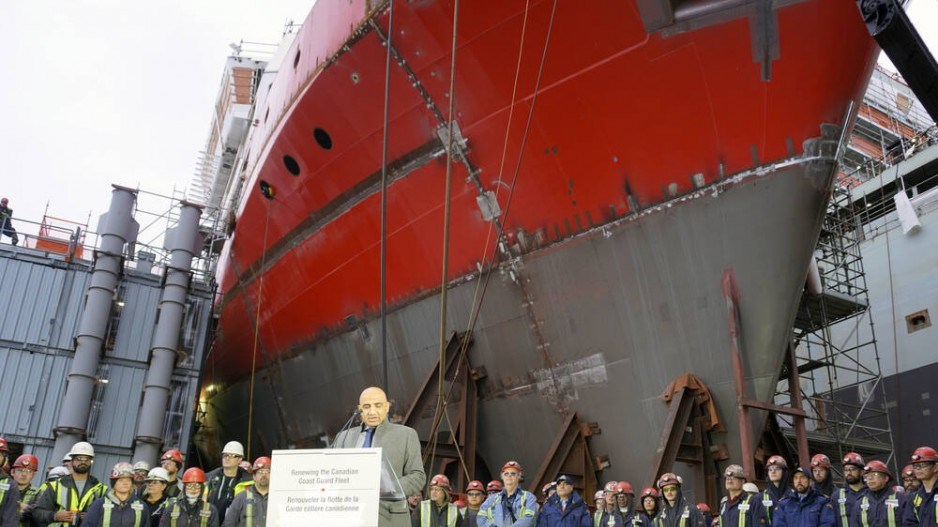Things are coming together at Seaspan’s Vancouver Shipyards – about 3,200 tonnes of steel, specifically.
Federal Public Services and Procurement Minister Jean-Yves Duclos marked a major milestone in the construction of the Canadian Coast Guard’s new offshore oceanographic science vessel, Wednesday – the consolidation of its massive steel blocks into one solid ship.
“All of the major parts of the new vessel have been assembled and built and they are being brought together to form the ship’s complete structure,” he said. “It’s a notable accomplishment in the construction of this important and essential new vessel. The OOSV is on track to be delivered to the Coast Guard in 2025 to support the next 20-plus years of cutting-edge scientific research that will help protect Canada’s fisheries, oceans and coastal areas.”
When it is completed and put into service in Atlantic Canada, the ship will hold 34 crew members and 26 scientists to work in its numerous floating labs. Like other Coast Guard ships, it will also be pressed into service for search and rescue missions and environmental response as needed. It replaces the 60-year-old CCGS Hudson, which was decommissioned in 2022.
Earlier this year, the budget for the oceanographic science vessel was updated from $995 million to $1.28 billion. Duclos said that was partly because the ship is the “first and only” of its class, and the estimates had to be adjusted as the designers and builders came to better understand what would be asked of the vessel.
And Duclos said the project faced the same disruptions, supply chain challenges and cost pressures that every infrastructure project has gone through during and after the pandemic.
The science vessel is one of several that Seaspan will be expected to produce under the National Shipbuilding Strategy, following CCGS Sir John Franklin, CCGS Capt. Jacques Cartier and CCGS John Cabot, all of which are already on the water.
Two Royal Canadian Navy joint support ships are under construction currently, and when launched, will be the longest ships ever built in Canada.
John McCarthy, CEO of Seaspan Shipyards, praised the company’s workers for their progress on oceanographic science vessel and other ships under construction.
With each ship, lessons are being learned and Seaspan is making improvements, McCarthy said.
“With each block, with each ship, we’re getting better, more efficient, and faster,” he said. “We’re seeing a nearly 40 per cent reduction in labour hours from ship one to ship two on the first 25 per cent of the blocks. Truly remarkable.”
Designs are currently under way for a polar icebreaker, which will come in at 6,000 tonnes heavier than the joint support ships. Beyond that, the government has 16 multipurpose vessels on order.
“So we’ve got work here at Seaspan Shipyards into the late 2030s,” McCarthy said.
With 4,000 employees at three shipyards in B.C., the company is projected to contribute $27 billion to the country's gross domestic product over the next 12 years, McCarthy said.




